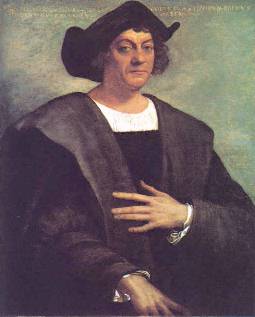 In a comment to this post celebrating Isaac Newton’s birthday, a Reader asked me who was the even more influential person of the last thousand years. I thought it was an interesting question, so here’s my answer: Christopher Columbus. “Christopher Columbus” is an Anglicization of the Latin form of his name, “Christophorus Columbus.” In other countries he is known as “Cristóbal Colón,” “Christovam Colom,” or “Cristoforo Colombo,” and probably what really counts is his name as it would have been said by his original countrymen, the Genoese — “Christoffa Corombo.” But I’m from the United States, and Columbus is the name by which he is known here, so that’s what I’ll call him.
In a comment to this post celebrating Isaac Newton’s birthday, a Reader asked me who was the even more influential person of the last thousand years. I thought it was an interesting question, so here’s my answer: Christopher Columbus. “Christopher Columbus” is an Anglicization of the Latin form of his name, “Christophorus Columbus.” In other countries he is known as “Cristóbal Colón,” “Christovam Colom,” or “Cristoforo Colombo,” and probably what really counts is his name as it would have been said by his original countrymen, the Genoese — “Christoffa Corombo.” But I’m from the United States, and Columbus is the name by which he is known here, so that’s what I’ll call him.
Columbus is important, but not because he was the first European to discover the Americas. That was Bjarni Herjólfsson,* who sailed from Norway to Iceland in 985, got blown off course, and wound up exploring both the east and west sides of what is known today as the Davis Strait, which separates Greenland from Baffin Island in Canada. Herjólfsson, not Columbus, was the first European to sail to the Americas (and return home to tell the tale).
And if you believe some people, the Chinese sent trade and exploration ships to the Americas in 1421, and they started colonies (which either failed or became amalgamated into local populations). However, if this is true, the Chinese failed to follow up on their achievement because of changes in political and economic conditions back home, which left the field open for Europeans three generations later. There is some interesting evidence that conjecturally supports this theory. But when the Europeans came, they did not just bring their guns and their trade goods and their colonists. They also brought smallpox, bubonic plague, and a host of other diseases, which devastated the native population. Those diseases were known in China also; why, then, were there not the same massive deaths from contact with the Chinese that we know for a fact came after contact with the Europeans? That question makes it unclear in my mind as to whether the Chinese did discover the Americas. And if the Chinese did discover the Americas, they did not conquer and colonize like the Europeans did, so Zheng He does not deserve the same symbolic importance which I attribute to Columbus.
I pick Columbus as “man of the millenium” because he was the vanguard for the European expansion into the Americas. Herjólfsson’s discovery was widely ignored for nearly a generation, and then Lief Ericsson and his followers attempts at forming a colony at what they called Vinland (at L’Anse aux Meadows in Newfoundland) failed. Columbus began a wave of settlement, beginning with the Spanish and the Portuguese and later included the French, Dutch, English, Swedish, and Russian peoples moving large, armed portions of their population to the New World, displacing the people who were already there and creating European-style societies in their place. Along with his brother Bartholomew, Columbus personally founded the first Spanish colonies in the New World, one of which (Santo Domingo, the capital of the Dominican Republic) remains a vibrant city today.
To a lesser extent, the expansion of European civilization into Africa, India, and Australia also happened at more or less the time of Columbus and in the wake of his achievement. This two-hundred year long spasm of European expansion and conquest has forever transformed the world’s politics and economy from just before 1500 to just after 1700. The European conquest and colonization of much of the rest of world is, in my opinion, the most significant event of the past millenium. It was too massive an action to be undertaken by one person, but one person, Columbus, serves quite well to symbolize that event.
If you think someone else was more influential than Columbus, in the time span from 1008 to today, I’d love to hear your opinion.
* Pronounced just like it’s spelled.
“* Pronounced just like it’s spelled.”Just wanted to know your injections of humor are always always appreciated. 🙂